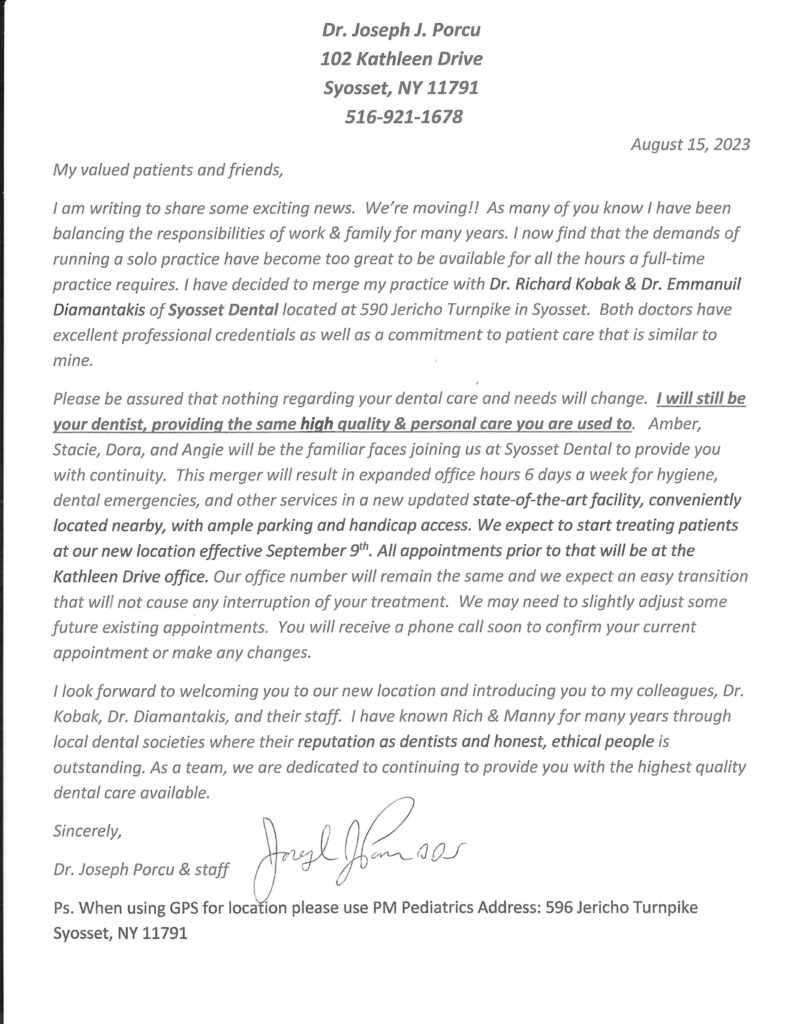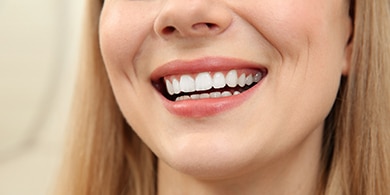 Not every dental emergency is the same, and you may not react to every one as though it were an emergency. However, the one thing they all have in common is a need for immediate attention. Whether your tooth starts to hurt or you experience accidental trauma to one or more of them, waiting to seek treatment will only give the problem more time to progress. Depending on the specific nature of the emergency, this could lead to increasingly more severe complications with your teeth and/or oral structures. Today, we take a brief look at a few of the common dental emergencies, and why seeking treatment as soon as possible is the best thing you can do for your smile. (more…)
Not every dental emergency is the same, and you may not react to every one as though it were an emergency. However, the one thing they all have in common is a need for immediate attention. Whether your tooth starts to hurt or you experience accidental trauma to one or more of them, waiting to seek treatment will only give the problem more time to progress. Depending on the specific nature of the emergency, this could lead to increasingly more severe complications with your teeth and/or oral structures. Today, we take a brief look at a few of the common dental emergencies, and why seeking treatment as soon as possible is the best thing you can do for your smile. (more…)
3 Possible Reasons Why Your Tooth Hurts
 If you’ve never had to deal with a toothache, then there’s a good chance that you might at some point in your life. The good news is that it isn’t always an immediately serious condition, but if ignored long enough, even the most minor toothaches can progress into much more severe pain. Because a toothache can have such a wide variety of potential causes, there is no one-size-fits-all treatment for one. Instead, your dentist will carefully examine your teeth and diagnose the cause of your discomfort, then consult with you to determine the best way to deal with it. (more…)
If you’ve never had to deal with a toothache, then there’s a good chance that you might at some point in your life. The good news is that it isn’t always an immediately serious condition, but if ignored long enough, even the most minor toothaches can progress into much more severe pain. Because a toothache can have such a wide variety of potential causes, there is no one-size-fits-all treatment for one. Instead, your dentist will carefully examine your teeth and diagnose the cause of your discomfort, then consult with you to determine the best way to deal with it. (more…)
Why Skipping Your Dental Cleaning Is a Bad Idea
 The fact that professional dental cleaning is vital to a healthy smile is common knowledge. However, it doesn’t stop many people from avoiding, neglecting, or postponing their visits when time seem short. Even if you do an amazing job of consistently brushing and flossing your teeth every day, regular dental cleanings are essential to ensuring that your smile remains healthy for life. If you skip even a single appointment, then your hygiene efforts alone may not be enough to protect your smile from concerns such as tooth decay, gum disease, and more.
The fact that professional dental cleaning is vital to a healthy smile is common knowledge. However, it doesn’t stop many people from avoiding, neglecting, or postponing their visits when time seem short. Even if you do an amazing job of consistently brushing and flossing your teeth every day, regular dental cleanings are essential to ensuring that your smile remains healthy for life. If you skip even a single appointment, then your hygiene efforts alone may not be enough to protect your smile from concerns such as tooth decay, gum disease, and more.
Common Things that Contribute to Tooth Loss
 Today’s dental treatments can help you preserve and improve your smile even after losing one or more teeth. However, your smile is healthiest when all of your teeth are natural and healthy, which is why preventing tooth loss is the better option, whenever possible. To do that, you have to know what your biggest risks of tooth loss are, and how best to address them before they become more of a threat. Today, we examine a few of the more common factors that often contribute to tooth loss, and what you can do to lower those factors and improve your chances of preventing it. (more…)
Today’s dental treatments can help you preserve and improve your smile even after losing one or more teeth. However, your smile is healthiest when all of your teeth are natural and healthy, which is why preventing tooth loss is the better option, whenever possible. To do that, you have to know what your biggest risks of tooth loss are, and how best to address them before they become more of a threat. Today, we examine a few of the more common factors that often contribute to tooth loss, and what you can do to lower those factors and improve your chances of preventing it. (more…)
Can Tooth Fillings Fail?
 When you experience a cavity, the whole point of filling it is to prevent the cavity from growing and your tooth from becoming more compromised. If your filling fails to accomplish its purpose, then your tooth can end up in a worse condition than before. Historically, failed fillings occurred most commonly because of the materials used to create them, such as metal amalgam. While effective, materials like metal change shape over time, expanding and contracting in ways that damage healthy tooth structure or leave it vulnerable to further decay. Today, however, modern fillings enjoy a substantially higher success rate. That’s thanks, in part, to improved methods of caring for your teeth and filling at home, and also thanks to more secure and biocompatible filling materials like tooth-colored composite resin. (more…)
When you experience a cavity, the whole point of filling it is to prevent the cavity from growing and your tooth from becoming more compromised. If your filling fails to accomplish its purpose, then your tooth can end up in a worse condition than before. Historically, failed fillings occurred most commonly because of the materials used to create them, such as metal amalgam. While effective, materials like metal change shape over time, expanding and contracting in ways that damage healthy tooth structure or leave it vulnerable to further decay. Today, however, modern fillings enjoy a substantially higher success rate. That’s thanks, in part, to improved methods of caring for your teeth and filling at home, and also thanks to more secure and biocompatible filling materials like tooth-colored composite resin. (more…)
Ask Your Dentist if You’d Benefit from Veneers
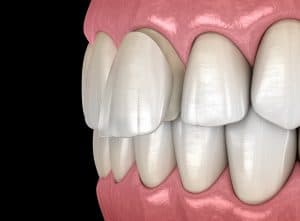 It isn’t just the desire for a healthier and more attractive smile that determines your best treatment option. In fact, you have several different highly customizable options to accomplish that. When it comes to improving your smile, it also matters how big of an impact your treatment will have on your long-term oral health. For many patients, porcelain veneers offer an optimal solution for several different reasons. Not only is the porcelain designed to closely mimic your healthy, natural tooth structure, but veneers are also made to address several different types of issues with your smile’s appearance. (more…)
It isn’t just the desire for a healthier and more attractive smile that determines your best treatment option. In fact, you have several different highly customizable options to accomplish that. When it comes to improving your smile, it also matters how big of an impact your treatment will have on your long-term oral health. For many patients, porcelain veneers offer an optimal solution for several different reasons. Not only is the porcelain designed to closely mimic your healthy, natural tooth structure, but veneers are also made to address several different types of issues with your smile’s appearance. (more…)
Could Your Bridge or Denture Use a Few Implants?
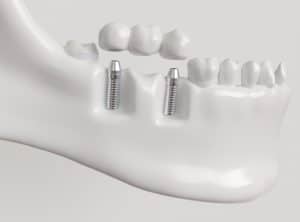 Maybe it’s time for a new bridge or denture because your current one has worn down too much to function properly. Or, perhaps, you may want a sturdier, more comfortable, and lifelike option that doesn’t involve hidden clasps, abutment teeth, or adhesives to remain in place. For many patients, traditional bridges and dentures are a viable option for replacing lost teeth. However, they require the unique support that only dental implants can provide to truly mimic the comfort and stability of healthy, natural teeth. By upgrading to an implant-supported prosthesis, you can almost instantly experience the benefits that the biocompatible, root-like posts offer. (more…)
Maybe it’s time for a new bridge or denture because your current one has worn down too much to function properly. Or, perhaps, you may want a sturdier, more comfortable, and lifelike option that doesn’t involve hidden clasps, abutment teeth, or adhesives to remain in place. For many patients, traditional bridges and dentures are a viable option for replacing lost teeth. However, they require the unique support that only dental implants can provide to truly mimic the comfort and stability of healthy, natural teeth. By upgrading to an implant-supported prosthesis, you can almost instantly experience the benefits that the biocompatible, root-like posts offer. (more…)
Is It Possible to Reverse Gingivitis?
 Most dental health concerns are chronic conditions, which makes treating them a top priority any time they develop. That’s especially true for gum disease, which can cause increasingly worse damage to your gums and jawbone until you eventually lose one or more teeth from lack of support. Once it becomes severe enough, the only way to protect your smile is to treat and manage your gum disease to prevent it from growing worse. However, in its earliest stage, known as gingivitis, you may still have a chance of reversing gum disease and avoiding the need for lifelong periodontal maintenance. (more…)
Most dental health concerns are chronic conditions, which makes treating them a top priority any time they develop. That’s especially true for gum disease, which can cause increasingly worse damage to your gums and jawbone until you eventually lose one or more teeth from lack of support. Once it becomes severe enough, the only way to protect your smile is to treat and manage your gum disease to prevent it from growing worse. However, in its earliest stage, known as gingivitis, you may still have a chance of reversing gum disease and avoiding the need for lifelong periodontal maintenance. (more…)
In Case Your Dental Hygiene Is Missing Something
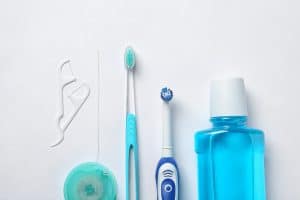 How well do you plan your dental hygiene routine every day? If you’re like most people, you’ve brushed and flossed and rinse your teeth so often that it barely takes any conscious thought, much less any planning. However, that familiarity is one reason why many people’s hygiene routines are lacking in one area or another, leading to the frequent development of preventable issues like tooth decay, gum disease, and more. Fortunately, there are many different highly customizable treatment options available to address such issues, though with a few tweaks to your hygiene routine, you’ll have a better chance at avoiding them altogether. (more…)
How well do you plan your dental hygiene routine every day? If you’re like most people, you’ve brushed and flossed and rinse your teeth so often that it barely takes any conscious thought, much less any planning. However, that familiarity is one reason why many people’s hygiene routines are lacking in one area or another, leading to the frequent development of preventable issues like tooth decay, gum disease, and more. Fortunately, there are many different highly customizable treatment options available to address such issues, though with a few tweaks to your hygiene routine, you’ll have a better chance at avoiding them altogether. (more…)
Dental Things that Are More Concerning as You Age
 The specific concerns that your smile faces depend on a variety of factors. For instance, the quality of your dental hygiene routine over the years, the presence of existing dental issues, and systemic conditions that are related to poor oral health can all become more prominent as time goes on. Fortunately, caring for your smile and addressing your risks of such issues isn’t necessarily more difficult. Even as you age, proper care and maintenance can help you maintain your healthy, natural smile and prevent dental health risks from becoming even bigger threats. (more…)
The specific concerns that your smile faces depend on a variety of factors. For instance, the quality of your dental hygiene routine over the years, the presence of existing dental issues, and systemic conditions that are related to poor oral health can all become more prominent as time goes on. Fortunately, caring for your smile and addressing your risks of such issues isn’t necessarily more difficult. Even as you age, proper care and maintenance can help you maintain your healthy, natural smile and prevent dental health risks from becoming even bigger threats. (more…)
